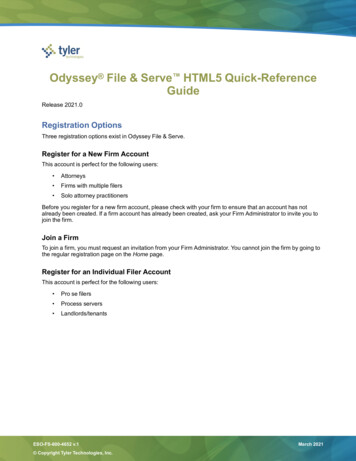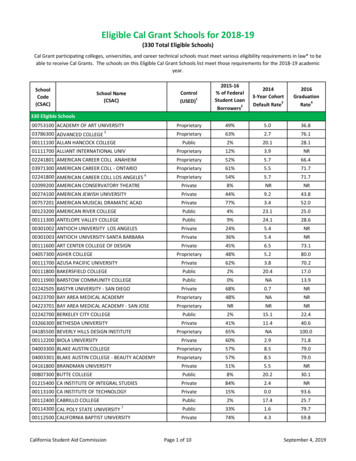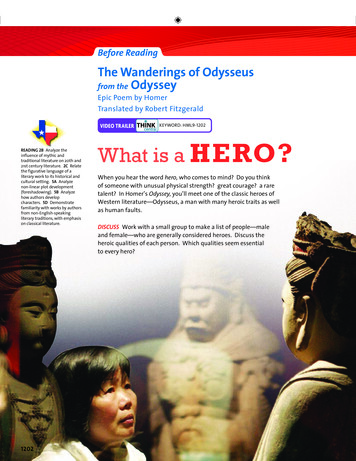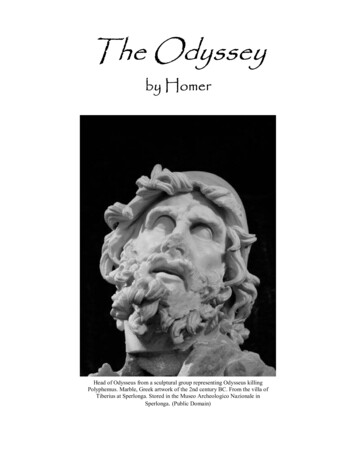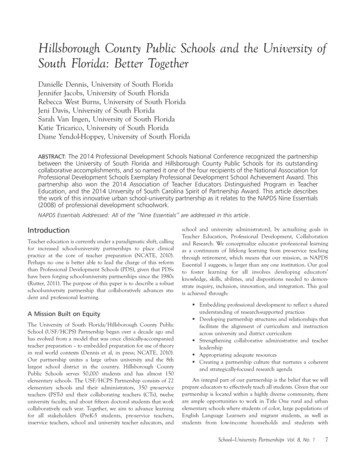
Transcription
OdysseyHomer’s Odyssey is generally considered to bethe sequel to the Iliad. Unlike many sequels inthe modern era, however, the Odyssey actuallyseems to be an improvement, in some respects,on the original and is quite capable of standingas an independent work.HOMERC. 700 BCEOdysseia, which has been this poem’s name inGreek since Herodotus called it that in the fifthcentury BCE , means simply ‘‘the story of Odysseus.’’ That story refers to the ten-year-long returntrip of Odysseus from Troy to his island home ofIthaca, off the west coast of Greece. Because theepic pertains to this long journey, the term odysseyhas since come to mean any significant and difficult journey.For more than fifteen hundred years, the Iliadand the Odyssey set the western standard by whichepic poetry was judged. The epic form in poetryseemed to die out with Milton’s Paradise Lost, butthe story of Odysseus has remained a perennialfavorite. Robert Fagles’s translation of the Odyssey, a Penguin Classics edition, appeared in 2006.AUTHOR BIOGRAPHYEverything known about Homer is either traditional, mythical, or some kind of an educatedguess. Traditionally, probably following theOdyssey and one of the so-called Homeric hymnsfrom the middle of the seventh century BCE ,4 8 5(c) 2011 Cengage Learning. All Rights Reserved.
O d y s s e yscholars to assign Homer to the middle or late partof the eighth century BCEAccurate dating of Homer’s poems is impossible, but it is generally thought that the Iliad is theolder of the two, as the Odyssey displays certainadvanced stylistic features. Both poems were completed before the Peisistratid dynasty came topower in Athens in the sixth century BCE , as amember of that family commissioned a standardedition of the poems and ordered that both theIliad and the Odyssey be recited in full at theGreat Panathenaia, a religious festival in honorof Athena, which was observed in Athens everyfour years.There have been various controversies aboutHomer since his time, beginning with the contention over just exactly where and when he was born,lived, and died. Some scholars have questionedwhether Homer existed at all, whether he actuallywrote the poems attributed to him or compiledthem from popular folklore, and whether thesame person is responsible for both the Iliad andthe Odyssey.Many scholars likely would agree that therewas an epic poet called Homer and that this poetwas instrumental in producing the Iliad andOdyssey in their known forms.Homer (Hulton Archive / Getty Images)Homer, like his own character Demodocus, wasbelieved to be a blind bard or singer of tales.At least seven different places have claimedthat Homer was born on their soil in the ancientworld. The two with the strongest claims are theisland of Chios and the city of Smyrna (modernIzmir, in Turkey). Because he records many detailsof Ionian geography and seems to know less aboutother areas (like western Greece, where part of theOdyssey is set), and because the most commondialect in Homer’s Greek is Ionic, many scholarsbelieve that Homer probably lived and worked inIonia, the region along the west coast of what isnow Turkey.When Homer lived and wrote is open fordebate. Some ancient writers believed that Homerlived relatively close to the time of the events hedescribed. The fifth-century historian Herodotusin his Histories said that Homer could not possiblyhave lived more than four hundred years before thefifth century. Nonetheless, the rediscovery of writing by the Greeks around 750 BCE and the development, at about the same time, of some of thefighting techniques described in the Iliad have led4 8 6E p i c sf o rPLOT SUMMARYThe Background to the StoryAfter ten years, the Trojan War is over and theAchaeans head for home, with varying results.Some, like Nestor, come home quickly to findthings pretty much as they left them. Others, likeAgamemnon, make it home quickly but find thingsconsiderably changed. Still others, like Menelaus,wander for a time but eventually return homesafely and little the worse for wear.Odysseus, by contrast, has no end of troublegetting home. As the story opens, it is the tenthyear since the end of the war, a full twenty yearssince Odysseus sailed off for Troy with the rest ofthe Achaean forces.Book 1: Athena Inspires TelemachusIn a council of the gods, Athena asks her fatherwhy Odysseus is still stuck on Calypso’s island,ten years after the end of the war. Zeus respondsthat Poseidon is angry at Odysseus for havingblinded his son, Polyphemus. But since PoseidonS t u d e n t s ,S e c o n d(c) 2011 Cengage Learning. All Rights Reserved.E d i t i o n ,V o l u m e2
O d y s s e yMEDIAADAPTATIONS In 1641, Claudio Monteverdi composed theopera Il Ritorno d’Ulisse in Patria (The Returnof Ulysses), treating Odysseus’s return toIthaca after his journey. In 1928, Richard Strauss composed the operaDie ägyptische Helena, based on the accountof Helen’s visit to Egypt in Book 4 of theOdyssey. In 1954, Dino De Laurentiis produced thefilm Ulisse (released in English as Ulysses inthe same year), directed by Mario Cameriniand starring Kirk Douglas as Ulysses andAnthony Quinn as Antinoos. This film wasre-released as a DVD in 2009. In 1963, Pietro Francisci directed the film Ercolesfida Sansone, released in 1965 in the UnitedStates as Hercules, Samson, and Ulysses. The 1967 British film Ulysses, based on the1922 James Joyce novel by the same title,starred Martin Dempsey and Barbara Jefford. In 1967, the British rock band Cream, madeup of Eric Clapton, Jack Bruce, and GingerBaker, recorded the song ‘‘Tales of BraveUlysses’’ on their second album, DisraeliGears. The song includes characters, themes,and motifs from the epic. There is at least a symbolic link betweenHomer’s poem and the classic 1968 MGMis temporarily out of the country, so to speak,Zeus gives her permission to begin arrangementsfor Odysseus’s return. Athena goes to Ithaca indisguise and inspires Odysseus’s son Telemachusto go in search of news of his father. Heartenedby her words, Telemachus announces his intention to sail to the mainland.Book 2: Telemachus Sails to PylosTelemachus calls an assembly and asks for assistance in getting to the mainland. His independentattitude does not sit well with his mother’s suitors,E p i c sf o rS t u d e n t s ,S e c o n dE d i t i o n ,production 2001: A Space Odyssey, directedby Stanley Kubrick and starring Keir Dullea. In 1969, Radiotelevisione Italiana (RAI)produced a television version of the epic,directed by Mario Bara and Franco Rossi. In May 1997, NBC television produced atwo-part miniseries of the Odyssey, starringArmand Assante, Isabella Rossellini, VanessaWilliams, and Irene Pappas. This productionwas re-released on DVD by Lionsgate Studiosin 2001. The 1996 Penguin Highbridge Audio cassetteof the Odyssey uses the Robert Fagles translation and is narrated by Sir Ian McKellen. The 2000 Universal Pictures film O Brother,Where Art Thou? is a comical remake of theOdyssey set in the 1930s South with bluegrass music. Noted storyteller Sebastian Lockwood produced a one-man video of his performanceof the Odyssey in 2006. The Perseus Project at Tufts University, whichwas available as of 2010 on CD-ROM fromYale University Press, offers both the originalGreek text and the Loeb Classical Librarytranslation in English, together with background information on many of the charactersand places in the poem.who oppose him in the assembly so that he doesnot receive the aid he seeks. After making secretpreparations, Telemachus and the disguised Athenadepart for Pylos that same evening.Book 3: Nestor Tells What He KnowsTelemachus and Athena arrive in Pylos to findNestor and his family offering sacrifice to Poseidon. After joining in the ritual, Telemachus introduces himself to Nestor and explains his purposein coming. Nestor has heard news of the return ofboth Menelaus and Agamemnon, which he relatesV o l u m e2(c) 2011 Cengage Learning. All Rights Reserved.4 8 7
O d y s s e yto Telemachus, but has had no news of Odysseussince sailing home from Troy ten years previously.Nestor sends Telemachus, accompanied by one ofhis sons, Pisistratus, to visit Menelaus in Sparta.Demodocus’s skill and offers him a prime cut ofhis own portion. When Demodocus sings thestory of the Trojan Horse, Odysseus begins crying again, and Alcinous asks Odysseus who he isand why stories about Troy make him cry.Book 4: In the Home of Menelaus and HelenTelemachus and Pisistratus arrive at Menelaus’shome as he is celebrating a wedding and are warmlyentertained by Menelaus and Helen. Menelaus tellsa long story of his adventures on the way home fromTroy, including news that he got from Proteus inEgypt that Odysseus was alive on Calypso’s island.Meanwhile, back in Ithaca, the suitors learn of Telemachus’s secret departure and are not pleased. Theyplot to ambush and kill him on his way home.Penelope also learns of her son’s departure.Book 5: Odysseus Sets Sail for Home andGets ShipwreckedAt another council of the gods, Zeus orders Hermesto go to Calypso and tell her that she is to letOdysseus leave for Ithaca. Calypso is unhappy,but obeys the order. She offers Odysseus a chanceto become immortal and to live with her forever, anoffer which he tactfully declines. Odysseus builds araft with tools and materials she provides and sailstoward home until Poseidon comes back fromfeasting with the Ethiopians and wrecks the raft ina storm. Odysseus, with the help of a sea goddess, iswashed safely ashore in the land of the Phaeacians.Book 6: Nausicaa Encounters a StrangerInspired in a dream by Athena, the Princess Nausicaa goes with several of her maids to do theroyal laundry. The washing place is near whereOdysseus has fallen asleep, hidden in a bush.Odysseus asks Nausicaa for help; she gives himsome clothing to wear and sends him into town tofind the palace of her father, Alcinous.Book 7: Odysseus and the King of PhaeaciaOdysseus arrives safely at the palace and begs theassistance of King Alcinous and Queen Arete.He gives an edited version of his adventures todate but does not disclose his identity. He deftlyturns aside Alcinous’s suggestion that he shouldremain in Phaeacia and marry Nausicaa.Book 8: The Phaeacians Entertain OdysseusThe Phaeacians treat Odysseus to a day of feasting, song, and athletic events. When Odysseusbegins weeping during Demodocus’s tale of theTrojan War, Alcinous cuts the banquet short. Atdinner that evening, Odysseus speaks highly of4 8 8E p i c sf o rBook 9: Odysseus Tells His Story—Polyphemus and the CyclopesOdysseus reveals his identity and tells his story,beginning with his departure from Troy withtwelve ships. He sacks Ismarus in Thrace, isblown off course to the land of the Lotus-Eaters,and eventually reaches the island of the Cyclopes,one-eyed giants who live in rustic anarchy.Odysseus and the crew of his ship go toinvestigate this island and end up in Polyphemus’s cave. The giant rolls a stone across thecave’s entrance, and, finding strangers inside,promptly turns a couple of Odysseus’s men intohis dinner. After a similar breakfast, he goes outwith his flocks, leaving Odysseus and his menpenned in the cave. Upon Polyphemus’s return,they manage to get the giant drunk, blind him,and then sneak out of the cave under the bellies ofhis sheep and goats. As they make their escape,Odysseus unwisely reveals his true name, andPolyphemus asks his father Poseidon to avengehis injury.Book 10: Odysseus Tells His Story—Atthe Islands of Aeolus and CirceOdysseus and his surviving crewmen now sail tothe island of Aeolus, king of the winds. Aeolusgives Odysseus a bag containing all the windsthat would prevent his reaching home. Theysail away and come close enough to Ithaca tosee the watch-fires, when Odysseus falls asleep atthe helm and his crew, thinking the bag containsa hoard of gold, untie it and release the captivewinds, which blow them right back to Aeolus’sisland.Aeolus refuses to have anything more to dowith them. Odysseus and his crew set sail oncemore and eventually reach the land of the Laestrygonians, who destroy all but one of his ships.The survivors sail to Circe’s island, where mostof them are promptly turned into pigs. Odysseus,forewarned by Hermes, avoids the sorceress’strap and frees his men. They remain with Circefor a year before Odysseus’s men ask to leave.Circe tells Odysseus that he must first visit theunderworld and consult with the shade of theprophet Tiresias on how best to get home.S t u d e n t s ,S e c o n d(c) 2011 Cengage Learning. All Rights Reserved.E d i t i o n ,V o l u m e2
O d y s s e yBook 11: Odysseus Tells His Story—Inthe House of the DeadObeying Circe’s instructions, Odysseus and hismen sail to the underworld where they make sacrifices to Hades and Persephone and consultTiresias. When Tiresias retires, the shades of Odysseus’s mother and several of his comrades at Troyappear, including those of Achilles and Agamemnon. Odysseus also witnesses the punishment ofseveral notorious offenders against the gods.Book 12: Odysseus Tells His Story—TheSun-God’s CattleUpon his return from the underworld, Odysseusreceives sailing instructions from Circe on how toavoid the lure of the Sirens and how to get pastthe monster Scylla and the whirlpool Charybdis.Above all, Circe warns Odysseus not to harm thecattle of the sun-god on the island of Thrinacia.Cast upon Thrinacia by a fierce storm and out ofprovisions, Odysseus’s men disobey him andslaughter some of the cattle. The sun-god complainsto Zeus, who destroys the ship with a thunderbolt.Only Odysseus survives, and he drifts to Calypso’sisland by hanging on to the ship’s mast. This endsOdysseus’s story as told to the Phaeacians.Book 13: Return to Ithaca and theStone ShipThe Phaeacians land Odysseus and all his treasureson Ithaca while he himself is deep asleep. Athena,in disguise, meets Odysseus, and he tries to trickher, without success, with a false story about himself. She reveals her identity and tells him howmuch she cares for him, and they plot a stratagemfor dealing with Penelope’s suitors. After stowingOdysseus’s treasure safely in a cave, Athena disguises Odysseus as an ancient beggar and sendshim on his way. Poseidon, angry that the Phaeacians have helped Odysseus get back to Ithaca,turns their ship into a huge stone, visible toonlookers on shore and rooted to the sea-bottom,as it sails into harbor on its return voyage.Book 14: The Loyal SwineherdOdysseus makes his way to the dwelling ofEumaeus, a swineherd who has remained loyal tohis long-absent employer. Odysseus, still in disguise, entertains Eumaeus with some ‘‘lying tales’’about himself.Book 15: Telemachus Heads for HomeTelemachus takes his leave of Helen and Menelausand tactfully evades Nestor’s further hospitality.E p i c sf o rS t u d e n t s ,S e c o n dE d i t i o n ,Telemachus offers passage to the seer Theoclymenus, who is fleeing vengeance for a kinsman’sdeath. Back in Ithaca, Eumaeus tells Odysseus thestory of his life. Telemachus evades the suitors’ambush and sends Theoclymenus home with afriend, as he intends to visit Eumaeus in the country before returning to the palace and the suitors.Book 16: Father and Son ReunitedTelemachus goes to Eumaeus’s hut, where Odysseus reveals himself to his son and impresses onhim the need for secrecy and deception if they areto overcome the suitors. Meanwhile, the ship thesuitors had sent out to ambush Telemachusreturns, and the suitors try without success tocome up with an alternative plan to get rid of him.Book 17: A Beggar at the GateTelemachus returns to the palace and speaks withhis mother. Eumaeus brings Odysseus to the palace.On the way they encounter the goatherd Melanthius, an ally of the suitors, who insults Odysseus.As Odysseus enters the palace, an old hunting dogrecognizes him and dies on the spot. Most of thesuitors treat Odysseus with at least grudging respect,but Antinous throws a footstool at him. Penelopeasks Eumaeus to arrange a meeting with the newvisitor.Book 18: The Two Beggar-KingsOdysseus is insulted by Irus, a professional beggarwhom the suitors favor. The two men fight, much tothe amusement of the suitors, and Odysseus quicklysubdues Irus. Penelope comes to the hall to extractpresents from the suitors and to announce her intention of remarrying. Odysseus is insulted by the maidMelantho and Eurymachus, one of the leading suitors, who throws another footstool at him.Book 19: Penelope Interrogates Her GuestOdysseus and his son take all the weapons fromthe great hall, assisted by Athena. Melantho againinsults Odysseus. Penelope speaks to the beggar,who claims to know Odysseus and tells her that heis nearby and will be home quickly. She does notbelieve him but orders his old nurse, Eurycleia, towash him. The nurse recognizes Odysseus by ascar he received as a young man and is sworn tosecrecy. Penelope details the trial of the bow bywhich she will choose her new husband on thefollowing day.V o l u m e2(c) 2011 Cengage Learning. All Rights Reserved.4 8 9
O d y s s e yBook 20: Things Begin to Look Bad forthe SuitorsCHARACTERSOdysseus lays awake plotting revenge until Athenaputs him to sleep. On the next day, the loyal oxherdPhiloetius arrives at the palace, where Odysseus isagain insulted by one of the suitors, Ctesippus,who throws an ox-foot at him. The suitors alllaugh at this, which Theoclymenus interprets as asign that they are all marked for death.AchillesBook 21: The Great Bow of OdysseusAchilleusPenelope fetches Odysseus’s hunting bow andannounces the test: She will marry the man whocan string the bow and shoot an arrow throughthe rings on twelve axe-heads set in a line in theground. Odysseus reveals himself to his two loyalservants and enlists their help in getting revengeon the suitors. None of the suitors is able to stringthe bow; Telemachus is on the point of succeedingwhen Odysseus stops him. Telemachus, by prearrangement with his father, sends his mother fromthe hall and gives the bow to Odysseus, who stringsit and shoots an arrow through the axes.See AchillesBook 22: The Death of the SuitorsWith his next arrow, Odysseus shoots Antinous andannounces his true identity to the rest of the suitors.Odysseus, Telemachus, Philoetius, and Eumaeus,assisted by the disguised Athena, kill the suitors.When all the suitors are dead, the disloyal maidsare hanged, and Melanthius is punished. The loyalservants begin to clean the palace after the slaughter.Book 23: The ReunionOld Eurycleia wakes Penelope with the news thather husband has returned and destroyed the suitors. Penelope refuses to believe it. When Odysseusanswers her trick question about their marriagebed, she accepts him as her husband, and they retireto bed after making plans to deal with the relativesof the suitors whom Odysseus has just killed. Beforethey sleep, Odysseus tells his wife his true story.Son of the mortal Peleus and the sea goddessThetis, Achilles was the best warrior at the siegeof Troy. Odysseus encounters his shade (spirit) inthe underworld in Book 11 while waiting for theseer Tiresias to tell him how he is to return homeafter being delayed for ten years.AeacidesSee AchillesAeolusThe son of Hippotas, Aeolus is beloved of the godsand Zeus put him in charge of the winds. He andhis family (six sons married to six daughters) liveon Aeolia, a floating island. After listening toOdysseus’s tales of Troy, he agrees to help andmakes Odysseus a present of a bag containingall the adverse winds that could blow him offhis proper course home. Unfortunately, Odysseus’s men untie the knot, thinking they will findgold in the bag, and the winds blow them back toAeolia. Aeolus casts them out, saying he has nodesire to help anyone who is so obviously cursed bythe gods.AgamemnonSon of Atreus, brother of Menelaus, and king ofMycenae, Agamemnon was the commander ofthe Achaean forces at Troy. Odysseus encountershis shade in the underworld while waiting for theseer Tiresias to tell him how to get home after tenyears of wandering.AiasSee AjaxAjax (Oilean, the Lesser)Book 24: Peace at LastThe suitors’ shades arrive in Hades and tell Agamemnon and Achilles of Odysseus’s triumphantrevenge on them for their destruction of his estate.Odysseus goes to meet his aged father Laertes in thecountry and, after telling him another ‘‘lying tale,’’reveals himself to his father. The suitors’ relativesarrive at that point, seeking vengeance for the deathof their kinsmen. Athena and Zeus intervene in thefighting that ensues and, after a few of the suitors’relatives are killed, Athena makes peace.4 9 0E p i c sf o rSon of Oileus and leader of the Locrians at Troy,Ajax is shipwrecked on his way home after thewar. He boasts of having escaped the sea in spiteof the gods—and is subsequently drowned byPoseidon. Odysseus encounters his shade in theunderworld in Book 11.Ajax (Telamonian, the GreaterSon of Telamon and grandson of Aeacus (whowas also grandfather of Achilles), Ajax was oneof the bravest and strongest fighters at Troy.S t u d e n t s ,S e c o n d(c) 2011 Cengage Learning. All Rights Reserved.E d i t i o n ,V o l u m e2
O d y s s e yOdysseus encounters the shade of Ajax in theunderworld and apologizes for the outcome oftheir contest at Achilles’s funeral games, but Ajax,angry with Odysseus even after death, refuses tospeak to the man he believes had unfairly beatenhim in life.AreteNiece and wife of Alcinous and mother of Nausicaa, Arete is queen of the Phaeacians. Her namemeans virtue or excellence in Greek.ArtemisDaughter of Zeus and Leto, twin sister of Apollo,Artemis is a virgin goddess of the hunt, the moon,and, in some traditions, of childbirth and theyoung. As is frequently seen in the Odyssey, plaguesand other diseases, and sometimes a peaceful deathin old age, are often explained as being the result of‘‘gentle arrows’’ shot by Artemis (for women) or byher brother Apollo (for men).Ajax the GreaterSee Ajax (Telamonian, the Greater)Ajax the LesserSee Ajax (Oilean, the Lesser)AkhilleusAthenaSee AchillesAlcinousSon of Nausithous, husband of Arete, and fatherof Nausicaa and Laodamas, Alcinous, whosename means sharp-witted or brave-witted, isking of Phaeacia and a grandson of Poseidon.Homer depicts him as a kind, generous, andnoble man, eager to help the stranger and puthim at ease. He suggests that Odysseus shouldstay in Phaeacia and marry his daughter.Athena is the daughter of Zeus and M etis, whoZeus (following in the tradition of his own father,Cronus) swallowed when it was revealed that shewould someday bear a son who would be lord ofheaven (and thus usurp Zeus’s place). She wasborn, fully grown and in armor, from the headof Zeus after Hephaestus (or, in some traditions,Prometheus) split it open with an axe.AtheneSee AthenaAtreidesAntinoosSee AgamemnonSee AntinousAtridesAntinousSee AgamemnonSon of Eupithes, Antinous (whose name literallymeans anti-mind and could be translated as mindless) is a bold, ambitious, and obnoxious suitorfor Penelope’s hand.AphroditeAphrodite is the Greek goddess of love. Accordingto Homer, she is the daughter of Zeus and Dione.She is married, though not faithful, to Hephaestus,god of fire and smithcraft.ApolloThe son of Zeus and Leto, and twin brother ofArtemis, Apollo is the god of archery, prophecy,music, medicine, light, and youth. As is frequentlyseen in the Odyssey, plagues and other diseases,and sometimes a peaceful death in old age areoften explained as being the result of ‘‘gentlearrows’’ shot by Apollo (for men) or by his sisterArtemis (for women).E p i c sf o rS t u d e n t s ,S e c o n dE d i t i o n ,BriseisBriseis is the war prize given to Achilles after hisattack on Lyrnessus during the Trojan War. WhenAgamemnon has to give up Chryseis, he takesBriseis as compensation, and this action instigatesthe quarrel between him and Achilles.CalypsoDaughter of Atlas, who holds the world upon hisshoulders, Calypso (whose name is related to theGreek verb to hide and which might therefore betranslated as concealer) is a goddess who lives onthe island of Ogygia. She has fallen in love withOdysseus during the seven years he has lived onher island and proposes to make him immortal,not a gift given lightly.CirceDaughter of Helios (the sun-god) and Perse, andsister of Aeetes, the king of Colchis who so plaguedV o l u m e2(c) 2011 Cengage Learning. All Rights Reserved.4 9 1
O d y s s e yJason and the Argonauts, Circe is a minor goddesswho ‘‘speaks with the speech of mortals.’’ She isalso a powerful enchantress. Her specialty lies inturning men into pigs. Yet once she recognizesOdysseus and swears an oath not to harm him,she becomes the most charming of hostesses, somuch so that Odysseus and his men remain withher an entire year.go back. Eurylochus eventually turns on Odysseusand refuses to obey him on Thrinacia, instead urging the rest of the men to slaughter the sun-god’scattle.EurylokhosSee EurylochusCtesippusEurymachosCtesippus is one of the suitors for Penelope. Hisname literally means horse-getter, so he mayliterally be a horse-thief.See EurymachusDemodocusThe blind bard, or poet, of the Phaeacian court,traditionally, Demodocus has been taken as representing Homer, but not all scholars accept this idea.DemodokosSee DemodocusEumaeusSon of Ctesius, who was king of two cities on theisland of Syria (not to be confused with the MiddleEastern country of the same name), Eumaeus waskidnapped at a young age by one of his father’sserving women and taken by Phoenician traders,who sold him to Laertes, Odysseus’s father. Odysseus’s mother, Anticleia, raised him together withher own daughter, and then sent him to the country when the daughter was married. His namemight mean something like one who seeks the good.EumaiosSee EumaeusEurycleiaEurycleia is the long-time servant of Odysseus’sfamily. Odysseus’s father Laertes bought her inher youth for twenty oxen, a significant price. Shewas Odysseus’s nurse and later the nurse of Telemachus. In her old age, she attends Penelope.EurymachusSon of Polybus, Eurymachus is described as the‘‘leading candidate’’ for Penelope’s hand. Hisname means wide-fighting.Eurymachus is arrogant, disrespectful, hypocritical, cowardly, and abusive. He is the secondof the suitors to die by Odysseus’s hand. Odysseus’s words to him, after Eurymachus offers tomake good on the damages the suitors have doneto his household in his absence, are virtually thesame as Achilles’s words in response to Agamemnon’s offer of a ransom for Briseis in Book 9 ofthe Iliad.EurymakhosSee EurymachusHelenThe wife of Menelaus, Helen went, apparentlywillingly, with Paris to Troy. The resulting warformed the background for Homer’s other epicpoem, the Iliad.One might have expected Menelaus to beangry with Helen for running off to Troy, andshe with him for having dragged her back. Instead,Homer describes in them a couple enjoying maritalbliss: Helen and Menelaus are to all appearancesdeeply in love with one another and quite happy tobe back in Sparta among their people and theirpossessions.EurylochosKalypsoSee EurylochusSee CalypsoEurylochusA companion of Odysseus, Eurylochus is the onewho ties Odysseus to the mast to keep him fromresponding—fatally—to the song of the Sirens,and it is he who leads the first group of men toCirce’s palace, then has to report that they have notcome back out and begs Odysseus not to make him4 9 2E p i c sf o rKirkeSee CirceKtesipposSee CtesippusS t u d e n t s ,S e c o n d(c) 2011 Cengage Learning. All Rights Reserved.E d i t i o n ,V o l u m e2
O d y s s e yLaertesSon of Arcesius (and thus a grandson of Zeus),husband of Anticleia, and father of Odysseus,Laertes was one of those (along with Menoetius,father of Patroclus; Peleus, father of Achilles; andTelamon, father of Ajax the Greater) who sailedwith Jason on the Argo in the quest for the GoldenFleece, according to pseudo-Apollodorus.By the time the Odyssey begins, however,Laertes is old and worn by care and grief. Hiswife has died, his son has been absent for twentyyears, first at the Trojan War and then on hiswanderings home from it. Laertes has retired toa country estate, where he lives more like one ofthe servants than the owner.regal, Nausicaa seems to think that he wouldmake a suitable husband, a sentiment her fatherechoes. Her name, as with many of the Phaeacian characters, is related to the Greek word forship, naus.NausikaaSee NausicaaNestorThe only surviving son of Neleus, Nestor is theelderly king of Pylos, where it is said that he hasreigned for three generations. Nestor’s role is thatof the elder statesman and advisor.OdysseusMelanthiosSee MelanthiusMelanthiusSon of Dolius, Melanthius is Odysseus’s goatherd.During his master’s long absence, Melanthius hasbecome friendly with the suitors of Odysseus’swife Penelope. He insults Odysseus as Eumaeusis bringing him into town and again on the morning of the day that Odysseus kills the suitors. Heattempts to bring armor from the storeroom forthe suitors once Odysseus has revealed himself butis caught in the act by Eumaeus and imprisonedthere until the end of the fighting. He is severelymutilated (and presumably dies of his wounds) byTelemachus, Eumaeus, and Philoetius.MelanthoMelantho is the disloyal servant in the royal houseat Ithaca. She is verbally abusive to Odysseuswhen he is disguised as a beggar, and she becomesthe lover of one of the suitors.Odysseus is the son of Laertes and Anticleia, husband of Penelope, father of Telemachus, andabsent king of Ithaca. This epic chronicles histen-year journey home to Ithaca from Troy.Odysseus is a loyal husband, loving father, anda true hero who wants nothing more than toreturn to his home and his loved ones. To achievethis goal, he even turns down an easy chance atimmortality.OileanSee Ajax (Oilean, the Lesser)PelidesSee AchillesPenelopeSon of Atreus and brother of Agamemnon, Menelaus is king of Sparta and the husband of Helen. Inthe Odyssey, he shines as an example of the happyhusband and father, the good ruler, and the perfect hos
favorite. Robert Fagles s translation of the Odys-sey , a Penguin Classics edition, appeared in 2006. AUTHOR BIOGRAPHY Everything known about Homer is either tradi-tional, mythical, or some kind of an educated guess. Traditionally, probably following the Odyssey and one of the so-called Hom
